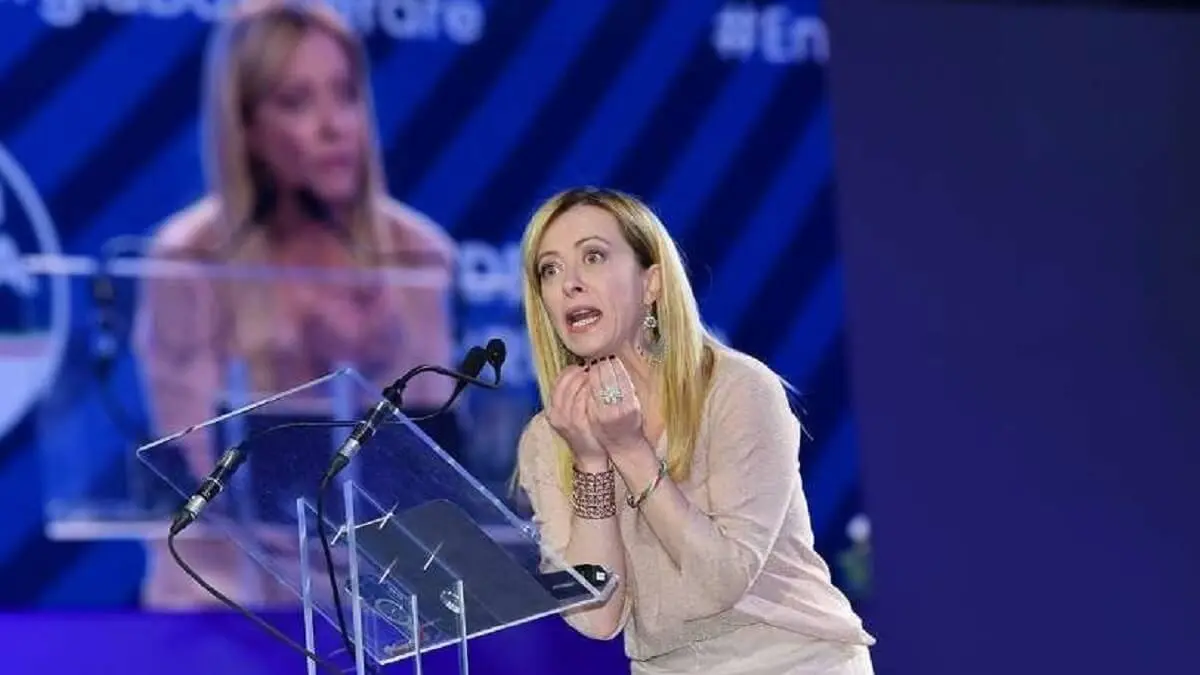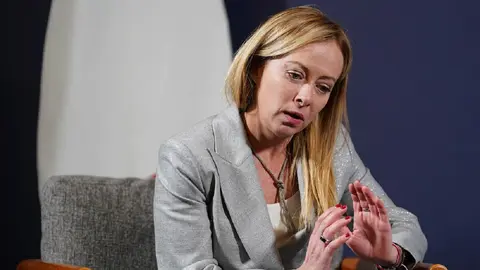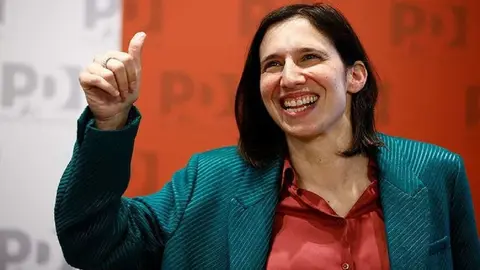The Meloni government, facing its most difficult hours

It was already known that the year 2024, which has just begun, would be by far the most difficult for the Meloni government since it became a reality in October 2022.
Roman politics found itself with a large parliamentary majority as a result of the landslide victory of the centre-right in the general elections of September of that year, and, in addition, it was coming from a very positive growth dynamic as a result of the brilliant management of the Draghi government: +8.3 points had grown the GDP in 2022, and it would still grow by 3.3% in 2023. What's more, the first State Budget (PGE) that his Minister of Economy and Finance (the lawyer Giorgetti) had to present was still expansionary in public spending, so that everything was "peaches and cream".
But the "winds" have changed in a year and a half and now Meloni and his government are experiencing their first difficulties. Just look at the facts: if in the elections for the government of both the Lazio and Lombardy regions (both held on 13 February 2023), the centre-right won a landslide victory, a year later, on 26 February last, In the southern region of Sardinia, the candidate of the Democratic Party (PD) and the Five Star Movement, the former deputy minister for economic development, Alessandra Todde, won the election, albeit by the narrowest of margins (45.4 per cent of the vote compared to 45 per cent for the centre-right candidate, Truzzi). In reality, the most worrying thing for the centre-right leaders (Meloni, Salvini and Tajani) is not that they lost the elections (which is also true, because in this region, a Salvini man named Solinas swept the polls five years ago), but that PD and Five Star, which in the general elections of September 2022 did not even win 35% of the vote, have now gained more than ten percentage points compared to the September 2022 elections.
There has been no shortage of accusations between Meloni and Salvini, with Tajani as a mere "spectator": the former (Meloni), who put up the candidate, accuses the latter (Salvini) of having mobilised the vote (there is talk of up to 5,000 "snipers") against the centre-right candidate in order to weaken her, which, needless to say, Salvini has completely denied. What is certain is that Meloni knows that it is one thing to put one of his candidates in his strongest fiefdom (Boccia, governor of the Lazio region since February last year, to give an example), and another to remove all those who gave victory after victory to Salvini in the first half of 2019: Bardi, Tesei, etc. All of them presidents of small southern regions, such as Abruzzo and Basilicata, or of the centre of the country, such as Umbria. So Meloni has not lost herself in further conflicts with Salvini and has agreed with Salvini and Tajani on the candidates in the up to six calls for the government of a region that there will be between now and the end of the year.
Because Meloni knows that she is getting closer and closer to a real journey through the desert, which is none other than "pyrrhic" growth (between +0.3 and +0.5 by 2024), loss of popularity due to the lack of reformist momentum (which is due, above all, to the fact that there are hardly any funds in the public coffers), and most worrying of all: a new flood of landings which, depending on how long it takes for the good weather to arrive, will begin to be significant in March and even more so in April. And Meloni already knows that she cannot count on the help of the EU authorities: the Germans have enough of a strong internal division and recession; the French have just changed their government to be able to face a second mandate of Emmanuelle Macron with guarantees, and they already have their own irregular immigration; and the Spanish have already agreed with the King of Morocco (Mohammed VI) the amount for the Maghreb kingdom to continue acting as a "buffer state" for irregular immigration.
Who will benefit more than anyone from a new immigration wave? Precisely his government colleague Matteo Salvini, who is already creating a new network of anti-European parties (Wilders governs in the Netherlands, "Alternative for Germany" is already the second largest political force in Europe's leading economy, and the National Front continues to enjoy very high levels of support in neighbouring France), and they also know that they can count on two external elements to further weaken the European Union: Vladimir Putin, the ruthless Russian dictator (what he has done with the opponent Navalny has broken all the "records" of sadism, proving that "the tsar must be the most ruthless of all if he wants to be the tsar"), and a Donald Trump who is heading straight for a second presidential term (his only rival in the Republican Party, Nikki Hailey, has already lost to him in all the caucus primaries held so far, including Hailey's homeland, South Carolina, where the former UN ambassador received fewer votes than Trump in her home county) and who knows that the Democratic Party, with Biden as its "front-runner", is heading for a historic debacle, although they still have time to find an alternative candidate.
In half a year's time Meloni will complete 730 days at the helm of the Council of Ministers. She will still have three more years in office, but by that time he may be so worn out that it would not be surprising if he were to resign. This will be the moment for Salvini, who, after having been a councillor, MEP, senator, twice deputy prime minister and head of both the Interior (2018-19) and Infrastructure (2022-present), knows that the only thing missing to complete his bulging political "CV" is the presidency of the Council of Ministers. Something, by the way, very difficult to digest for the President of the Republic, Sergio Mattarella, who, on his way to completing a consecutive decade (spread over two consecutive terms) as tenant of the Quirinal Palace, could find himself in the position of putting a person without a university degree in charge of forming a government, something that has never happened in the almost 78 years of life of the Italian Republic. Meloni, who is the 33rd person to hold the post of prime minister, has a university degree (journalism), as have all the previous prime ministers. This is to be expected in one of the most educated countries in the world.
Salvini barely has three dozen senators (to Meloni's 63), but the reality is that he is the one who gives Meloni the "maggioranza", although 24 more members of the Upper House must be added from the ranks of Forza Italia and Noi Moderati. It is also likely to win a significant level of support in the European elections, as it has hardly any rivals: the PD is linked to the socialist family, just as Italia Viva and Piu Europa (now coalitioned in "With Emma Bonino for the United States of Europe") are linked to "Renew Europe" (the family headed by Macron's France), and neither of them will have a high level of support because, as with Meloni, so much irregular immigration circulating on the streets of the eurozone's third largest economy only encourages the anti-European vote. And these irregular immigrants, most of them from the Sahel, do not want to stay in Italy, but to reach Germany, where the labour market is in need of a lot of manpower. But, given that neither the French, Swiss nor Austrians will let them through, they will stay in the transalpine nation, and Salvini will once again wave the flag of security in the streets, anti-Europeanism and ultra-nationalism.
The turning point for the Meloni government is likely to be the European elections, scheduled for the second half of June. They will be held in a rarefied climate: on the one hand, austerity policies in public spending have been set aside, but the return to the Stability and Growth Pact (with much more flexible rules, by the way) has caught the second (France), third (Italy) and fourth (Spain) economies of the eurozone at historic levels of indebtedness. And here the so-called "frugal countries" (those in the centre and north of the Union) did not give in: although Draghi and Macron (who ruled their respective countries between February 2021 and July 2022, when the Executive headed by Draghi fell) requested that the level of debt to GDP should rise from the 60% established in Maastricht to 100%, the fact is that the two fundamental rules (60% debt to GDP and 3% deficit in the annual accounts of each member country) have been maintained. What is more, countries such as Spain and Italy are committed, for the coming years, not only not to exceed the 3% deficit, but even to bring it down to 2.3-2.4%.
This reality left the Meloni government with no room for manoeuvre after the approval of the State Budget for 2024. The birth rate was not being promoted, the bridge over the Strait of Messina was not being built, and now all that was missing was a rebellion by farmers and livestock breeders. All this without forgetting that, as a result of the war between Ukraine and Russia, the cost of living has only increased: Matteo Renzi, in a recent interview, recalled that the so-called "shopping trolley" had risen by around 20% in recent years. Hence figures like him (who, if he does well in the European elections, could become the first president of the European Council since it was created back in 2008) are already beginning to call for an end to the Russian-Ukrainian contest, given Putin's failure to bring down the Ukrainian government and the fact that the Ukrainian counter-offensive is also turning into a real fiasco.
It is true that there may be a key element in the early end of this contest that began in February 2022: Donald Trump becoming president of the United States again, which could happen in the elections to be held in November of this year. Trump, despite his good relationship with Putin, is radically opposed to continuing to arm the Ukrainian army and wants his country to carry less and less of the Western world's military defence burden. And he does so in the knowledge that the creation of a European army is one of the unfinished business of European integration: there is European diplomacy, but without an army it is ineffective. Not to say that, at the moment, almost no relevant country is asking to be granted the leadership of the Union's foreign policy: Salvini himself, even before the previous European elections, and with an Italian (Federica Moguerini) leading the Union's foreign action, already made it clear that he had no interest whatsoever in retaining this "command post". In the end, the eurozone's third largest economy was given the post of Commissioner for Economic Affairs, which has been held for more than four years by Paolo Gentiloni, President of the Council of Ministers between December 2016 and May 2018.
The so-called "Meloni effect" has faded over time. At first, she changed many people's minds when it became clear that he was neither post-fascist, nor neo-fascist, nor even less far-right: how could he be in a political system where there is not one, but two chambers with equal legislative capacity, and where the head of state, an independent figure with a guaranteed seven-year mandate, is in charge of forming a government, appoints and dismisses ministers, and even decides whether or not to bring forward elections?
From this point on, the weaknesses of Roman politics have become apparent: above all, in the economic area. Let's see: the head of Economy and Finance, Giancarlo Giorgetti, is a son of organic politics whose figure languishes before the previous minister (Daniele Franco, director general of the Bank of Italy); Adolfo Urso, in charge of the "economic impulse" portfolio (Sviluppo Economico), is a journalist who has been in politics since 1994 and who has even less knowledge of economics than Giorgetti; and the head of Labour (the Sardinian Elvira Cardelone) is not known to have taken any relevant measures, although Italy is long overdue for labour market reforms and what is happening to her is just the umpteenth case of immobility. Some now remember that Meloni said in his campaign that his finance minister would be none other than Fabio Panetta, at that time a member of the board of the European Central Bank (ECB). And it is true that Panetta ended up "disembarking" in Rome, but not to take charge of the Ministry of Economy and Finance, but to become the new governor of the Bank of Italy, replacing Ignazio Visco.
Now Meloni, with a heavily indebted country, declining growth and growing political disaffection (and last week in Sardinia there was more voting than in 2019), knows what it is like to get into real difficulties. Her main advantage is that there are hardly any alternatives to her: apart from a Salvini whom Mattarella personally detests (because at the time he wanted to throw the citizenship on her by refusing to give Paolo Savona the Economy and Finance portfolio), only a retreating Tajani and some "exponents" of Meloni's party (Crossetto, Fitto and Nordio, for example) remain as alternatives. But it is well known that only three people have reached or surpassed 1,000 days in office for a transalpine government: Silvio Berlusconi (twice), Bettino Craxi and Matteo Renzi. And Meloni, who is about to exceed 500 days at the helm of the Council of Ministers, seems to have started the countdown. But before the elections for the various regional governments (Abruzzo, Basilicata, Campania, Piedmont, Piedmont, Umbria and Veneto), together with the elections to the European Parliament, make it clear that Meloni is definitely going downhill or, on the contrary, that he is still capable of making a comeback. And, while waiting, his partner in government (and generation), Matteo Salvini, more on the lookout than ever for his last chance to be "premier".
Pablo Martín de Santa Olalla Saludes is a professor at the Camilo José Cela University (UCJC) and author of the book "Italia, 2018-2023. De la esperanza a la desafección" (Madrid, Líber Factory, 2023).



